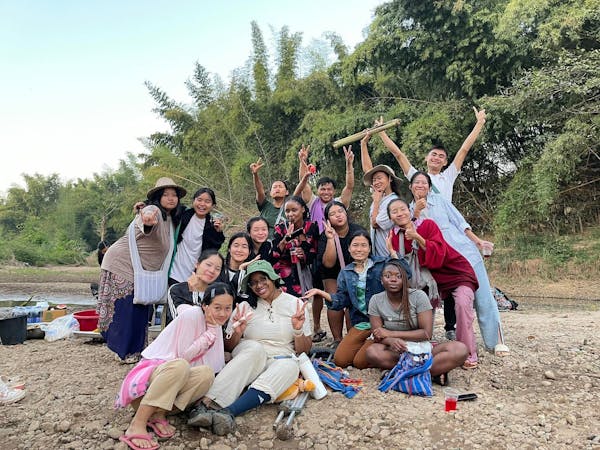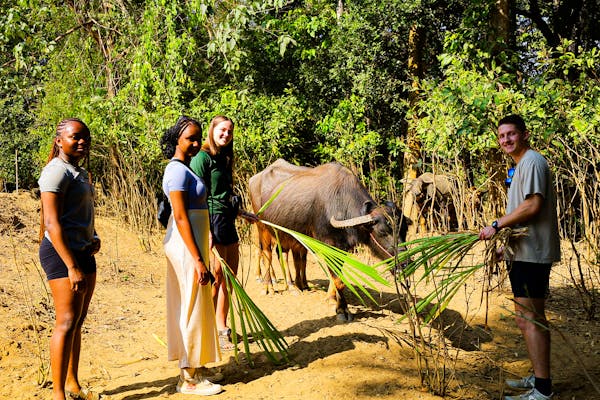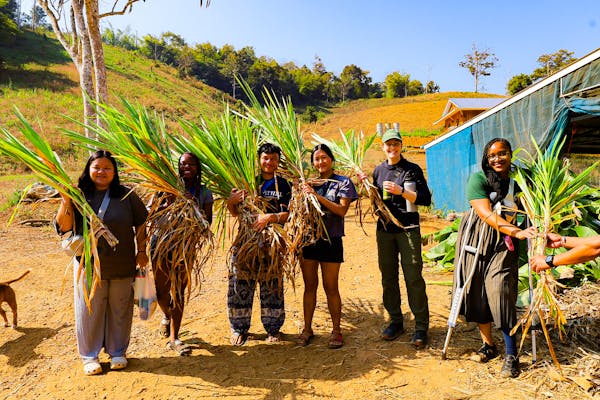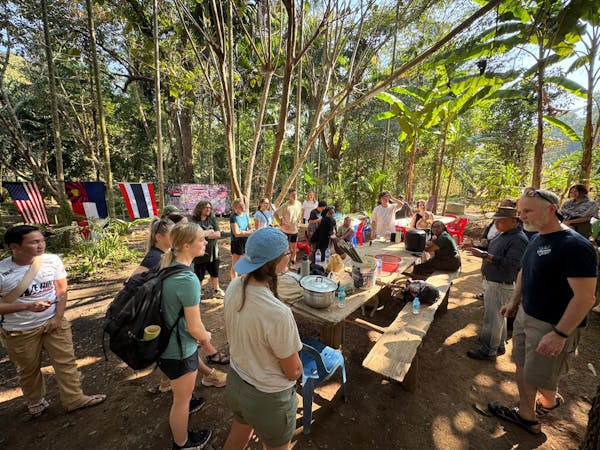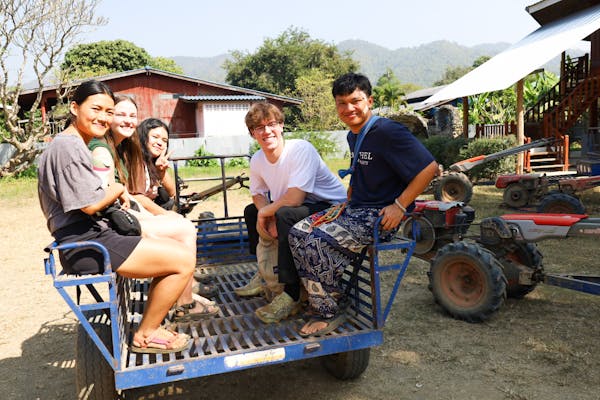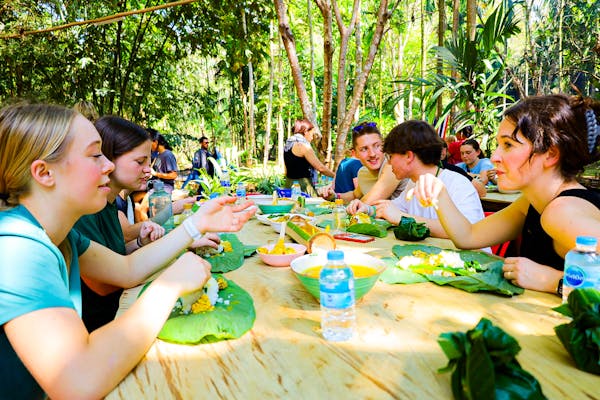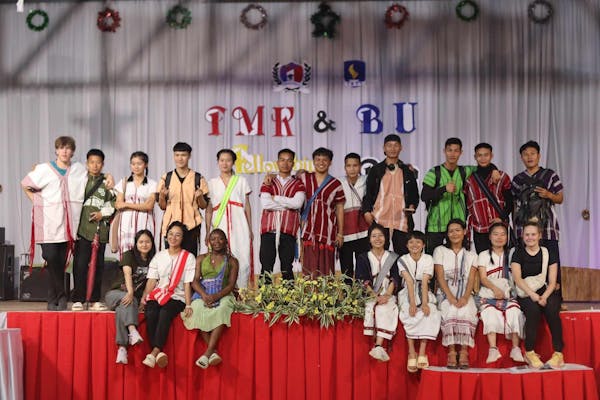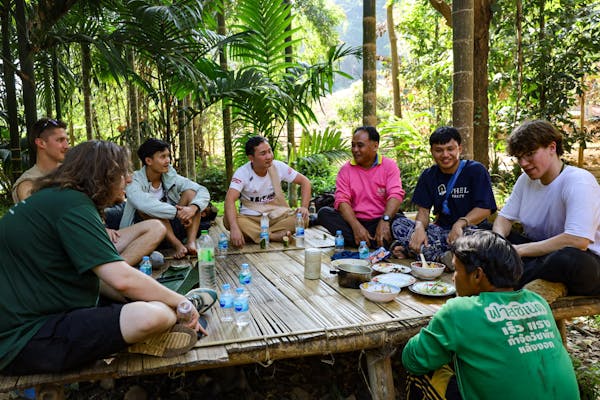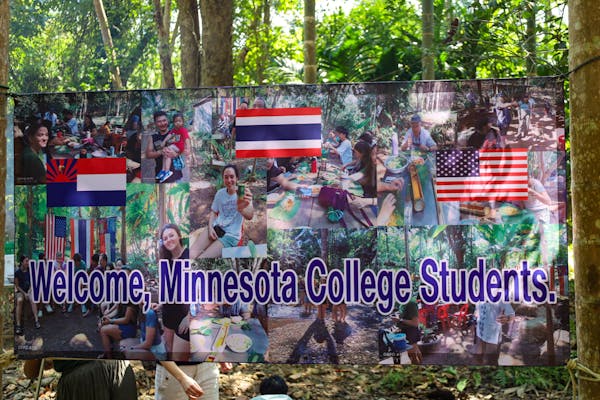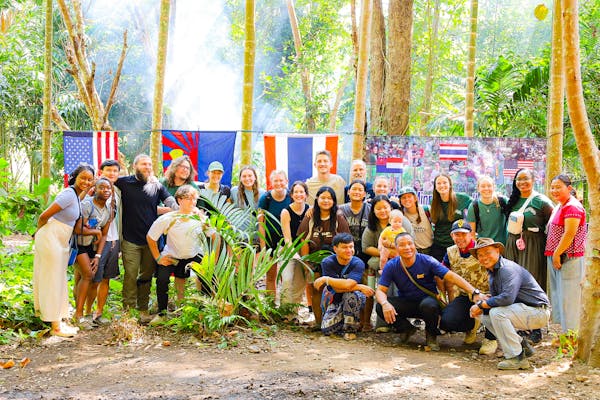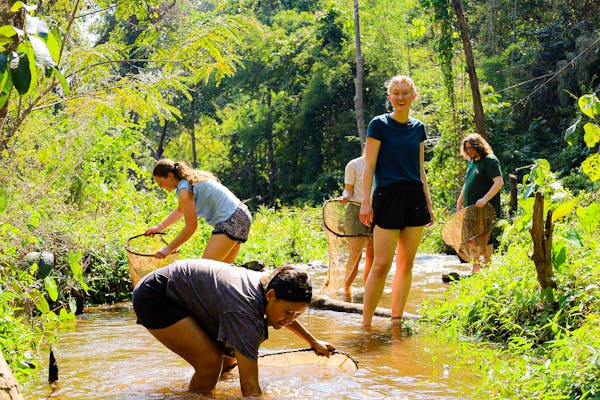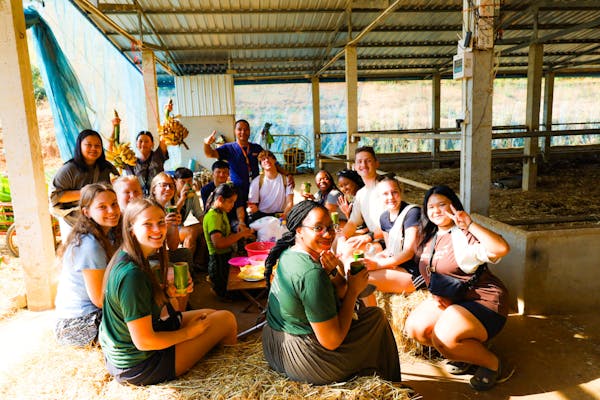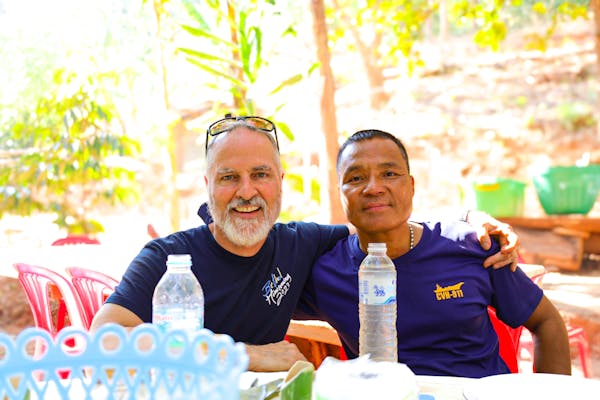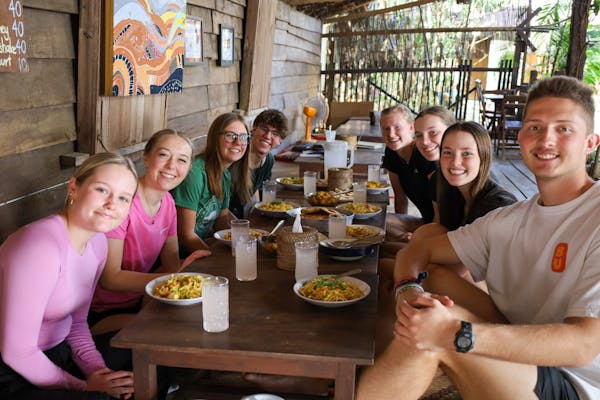A trip to the past changes the future
By Heather Schnese S’12, content specialist
March 17, 2025 | 10:30 a.m.

Eighteen Bethel students traveled to Thailand for a January session study abroad trip.
For many students, studying abroad means a chance to explore a new place and culture. But for five Bethel students, landing in Thailand for a January session trip meant returning to a place they had once lived—and had to flee.
They are Karen—or K’nyaw—a minority ethnic group originally from Myanmar (formerly Burma); their families immigrated to the United States from refugee camps in Thailand where they had fled Myanmar's brutal military junta that has been persecuting them for 75 years. They aren’t alone—St. Paul now has the largest and fastest-growing Karen community in the United States, and Bethel has more than 20 Karen students. This trip gave some of them a chance to spend time in their heritage culture, learn more about its history and continued struggles, and make lifelong friendships.
As part of the trip—designed as an immersive study on intercultural communication and ethnic diaspora—18 Bethel students stayed with host families and spent time at the Thoo Mweh Khee Learning Center in Tak Province, Thailand. The center is a school for more than 3,000 Karen students ranging from elementary school through post-high school, all from communities ravaged by government neglect and oppression. Bethel students also visited the nearby Mae La refugee camp—one of the largest of nine refugee camps created for the Karen—and spent time getting to know the college students there.
“I have seen this trip crystalize students’ sense of calling and purpose, or renew their commitment to vocation in the true sense—in alignment with God’s call on their lives,” says Ripley Smith, professor of intercultural and media communication and chair of Bethel’s communication studies department, who has taken students on this trip twice now. “It prompts a reflective process in one’s faith journey about what costly grace looks like in our lives—what it might look like when Jesus says, ‘go and sell all you have, and come follow me.’”
Learn more about the trip and meet Karen Bethel students changed by it.

Htee Moo ’27
International relations major, history minor
“We faced daily oppression. We didn’t have identification, and survival was incredibly difficult,” says Htee Moo of her family’s time in a Thai refugee camp. Her mom, a single parent, moved Htee and her two siblings to the United States when Htee was seven.
She first learned of Bethel through an aunt who had friends attending Bethel. During Htee’s senior year of high school, she took a PSEO healthcare course at Bethel and had the chance to take a tour. “As soon as I stepped foot on campus, I knew I wanted to attend Bethel,” says Htee. “I was drawn to the strong sense of community and its faith-based orientation. I also love the small class sizes, which allow for more interaction with the professors.”
While on the Thailand trip, Htee was most moved by her interactions with the students at Thoo Mweh Khee. “Despite the fact that we didn’t know each other, they treated us with so much respect and love. It was incredible to witness how genuinely kind and caring they were, going out of their way to make us feel welcome,” she says. “Their warmth made me realize how powerful human connection can be, even between strangers. It reminded me that kindness and care can bridge any gap, no matter the distance or differences between us.”
This realization in turn has caused Htee to want to be more present to those around her. “I realized that true hospitality and love aren’t just about actions—they come from a deeper place of understanding and respect,” she explains. “I want to embrace my roots more, love my people with the same kind of generosity, and foster a sense of community wherever I go.”
— Htee Moo ’27
Although always passionate about humanitarian work, Htee says this trip deepened her desire to give back to those who need it the most, and she’d like to return to the refugee camps or Kaw Thoo Lei (the Karen state created in Myanmar) to help. “This trip reaffirmed that my purpose lies in helping the people in my community, standing up for them, and working towards a future where they can live with dignity, safety, and opportunity,” says Htee. “It's not just a career path for me—it's a calling to serve my people and give back everything I can to ensure their voices are heard and their struggles are addressed.”

Kue Say ’26
Finance major, art minor
In Thailand years ago, Kue Say’s father was a boat driver, and his mother was a stay-at-home mom. They lived in a refugee camp. “The good thing about the refugee camps is that you get food monthly because there are not a lot of opportunities for employment. The camps were supposed to be temporary, but it’s been a couple decades now. And as long as the war is still going on in Myanmar, they’ll continue to exist.” He and his family immigrated to St. Paul when he was nine years old, and he learned about Bethel through people at his church.
For him, meeting General Shee Lay was one of the most powerful experiences of the trip. As commander-in-chief of the Karen National Defense Organization (KNDO), General Shee Lay shared with Bethel students how the voices of Karen people often go unheard amid the noise of civil war. “Talking with him felt like standing in the presence of hope, as if behind him were all my ancestors who still believe in a better future,” Kue says. “It was a privilege to meet someone so deeply connected to the ongoing fight for our people’s freedom.”
Kue speaks Karen, but reading and writing the language is still challenging for him. He’d like to change that. “Many Karen people in the United States mix English and Karen when speaking—it’s often called ‘Karenglish’—because we’re more comfortable blending both languages. However, I now see the importance of truly learning Karen to preserve our culture and history,” he explains. “If I can speak Karen well, I can be more useful in many ways, especially when I need to translate for other people, like my friends and families.”
— Kue Say ’26
At the Mae La refugee camp they visited, Kue met someone who is studying to become a missionary and hopes to open a school in Kaw Thoo Lei, Myanmar. “Helping to build a school is really exciting because it’s more than just education—it’s a step toward rebuilding our homeland,” he says. “For many Karen people, whether displaced in Myanmar, refugees in Thailand, or resettled in third countries, the dream is to see the civil war end and return home to rebuild. A school could be the beginning of that dream becoming a reality.” And Kue would like to be a part of it.

Lulu Shwe ’25
Art therapy major, psychology minor
Lulu Shwe, the youngest of six children in her family, came to the United States when she was four. She has no memories of the refugee camp she lived in, but says her family has always tried to keep the Karen culture part of their lives. “I have always been aware of what’s going on in Myanmar, but being able to go back allowed me to experience it from a different perspective,” she says. “Meeting so many impactful leaders and organizations made me realize the tremendous work they’re doing to preserve our culture and land. They go out of their way to help those still in Myanmar, whether it’s through donations, getting humanitarian supplies to the people, or standing on the front lines to defend and protect the innocent and vulnerable.”
— Lulu Shwe ’25
Lulu says she’s always been shy and introverted, so meeting and developing relationships with students and teachers at Thoo Mweh Khee caused her to step out of her comfort zone. And in the process, she learned more about herself and where she came from.
“One of the teachers explained that if we only stick to traditional ways, we risk getting stuck in the past. He emphasized the importance of balancing both modern and traditional elements, embracing change while honoring the past,” Lulu says. “It was a great reminder that our culture can evolve, and we can create something beautiful that honors both the old and the new.”
She was humbled by the hospitality of her host as well as the students at Thoo Mweh Khee despite the hardships they’re enduring. “The students had everything planned for us to make our time there as memorable as possible,” she says. “They were filled with so much joy, and were eager to get to know us and show us around.”
After graduation, Lulu plans to work and consider graduate school, but in the meantime would like to keep volunteering at The Urban Village—a local non-profit, co-founded by Bethel alum Jesse Phenow ’14. The Urban VIllage is a community space where the Karen community can participate in various programs and be empowered as youth, scholars, artists, musicians, entrepreneurs, and leaders to use their unique skills to serve their community.
To students considering a study abroad trip, she says: “You won’t be transformed just by going on the trip. You need to engage and fully immerse yourself in the culture. Learn the language, even if it’s something as simple as a daily greeting. Try a small bite of the culture’s food. Ask questions. Try things you’ve never done, and you might discover something you never thought you’d enjoy.”

Nay Seya ’27
Psychology and biology double major
Nay Seya’s family came to the United States when he was six years old, so memories of the refugee camp where they lived are hazy. And although his family has always shared stories about the struggles and hopes of the Karen people, he’s always felt detached from their significance. “I could only offer sympathy without fully understanding the profound challenges they faced,” Nay says. “I couldn’t grasp the concept of nationalism my parents had for the K’nyaw culture.” This trip changed that.
— Nay Seya ’27
“Experiencing the land and culture firsthand allowed me to grasp the full depth of our shared history, turning my sympathy into deep empathy,” he says. “This journey of rediscovery has enriched my identity, deepening my commitment to honor the resilience and aspirations of the K’nyaw people.”
Like Kue Say, hearing from General Shee Lay bolstered his commitment to the Karen community. “General Shee Lay said, ‘our words can reach way further than their guns.’ With that simple phrase, he reminded us that even though the K’nyaw people fight every day for their lives in the world’s longest civil war, most of the world barely notices their struggle,” says Nay. “He encouraged us to spread their stories with everyone we know. In doing so, our words have the power to shine a light on their hidden fight and help the world recognize the strength and determination of the K’nyaw people.”
Nay is able to attend Bethel with the help of the “Fight for Something” scholarship he received through Urban Village. “I truly believe I was meant to come to Bethel. Everything fell perfectly into place—its proximity to home, its strong foundation for nurturing my faith and culture, and the incredible blessing of the scholarship,” he says. “Bethel not only provides a strong Christian education but also fosters a community where I can embrace and celebrate my cultural identity with its connection with The Urban Village.”
He plans to continue raising awareness of the Karen culture. “Though I can’t return to the refugee camps or Kaw Thoo Lei yet, I’ll support the K’nyaw community in Minnesota,” he says. “Whether reconnecting our youth with their roots or assisting our elders, I’m committed to giving my all. I hope to inspire other K’nyaw people to embrace our heritage and continue our legacy of resilience.”

Shem Paw ’27
Elementary education major, sociocultural studies of education minor
With her parents and two sisters, Shem Paw came to the United States when she was five, and she recalls slowly losing touch with her Karen culture. “I attended a school that didn’t have Karen people, which made it difficult for me to understand my culture or even speak the language,” she says. “My English improved, but my Karen language skills faded, and I gradually adapted to American culture. As a result, I felt very disconnected from my own culture and often ashamed that I couldn’t speak my native language fluently.”
She recalls arriving at Thoo Mweh Khee and at first feeling embarrassed that she didn’t know more Karen and was also worried nobody would understand her. “However, instead of judgment, I was met with patience and kindness,” Shem says. “The people there took the time to speak Karen with me, which not only made me feel more comfortable but also helped me improve my language skills. They were incredibly warm and welcoming.”
For Shem, the time at Thoo Mweh Khee was “healing”—filling a void she didn’t know she needed to fill. “I was able to relive the games I had played and enjoy the foods I had missed in my childhood,” she says. “I also gained a deeper understanding of others’ lives as we shared our stories, discovering both our differences and surprising similarities.”
Having seen and experienced the value of education in Thailand, Shem is pursuing an elementary education major and plans to return to teach others. “Thoo Mweh Khee became more than just a place—it became a second home to me, a community I know I can always return to, where I will be welcomed with open arms."
— Shem Paw ’27
Shem is motivated by her parents, who sacrificed much in coming to the United States, seeking a better future for her and her sisters. She says, “While pursuing my education has its challenges, I always remind myself of my deeper motivation—to give back to my community.”
Loading Gallery...
Images from the January 2025 trip to Thailand
Expand your worldview
Nearly half of all Bethel students study abroad during college. With some 600 programs in various countries, you can immerse yourself in new cultures, develop a broader worldview, and gain valuable intercultural communication skills. These trips also allow you to explore God’s creation firsthand, gaining a deeper appreciation for the diversity of His world while also considering your purpose and calling in a global context.
